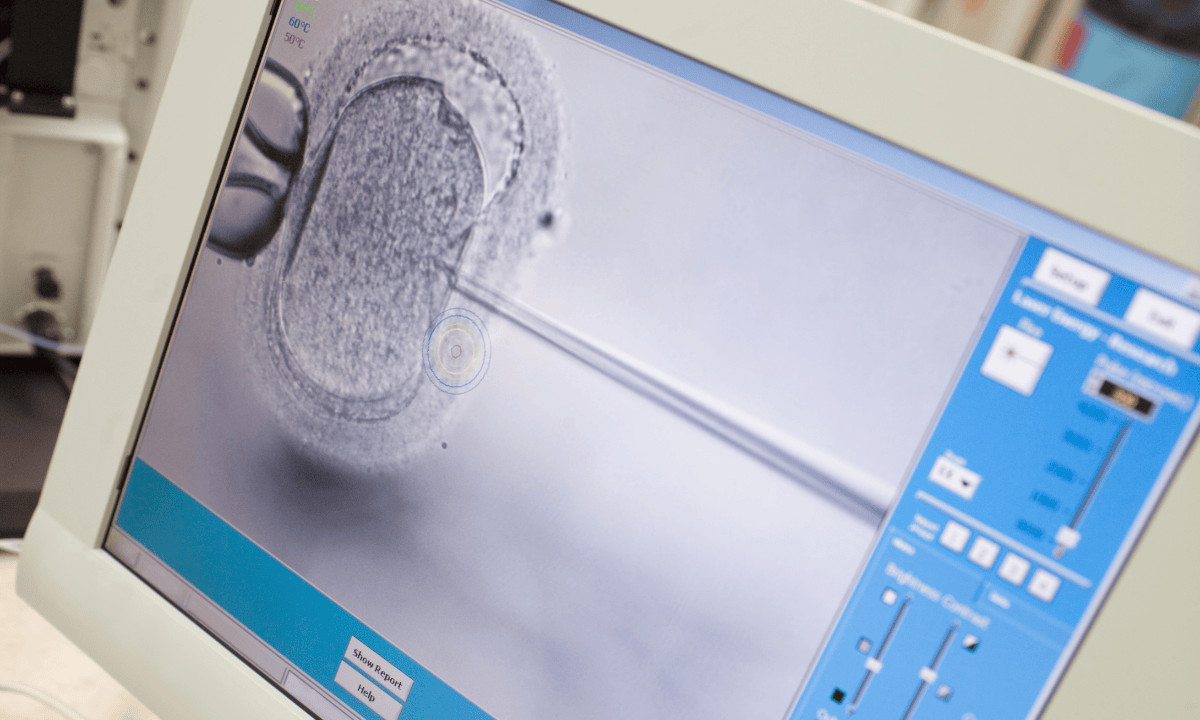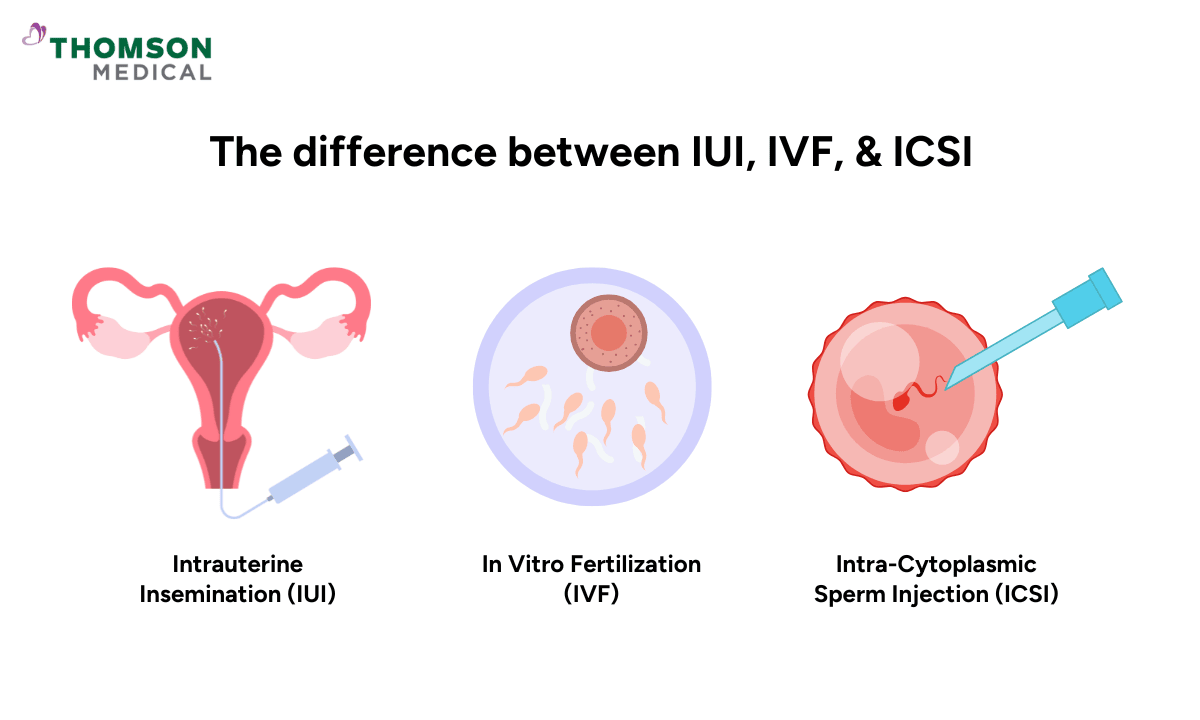You've tried. You've hoped. Every month that passes without a positive pregnancy test feels heavier than the last. When male infertility affects your ability to conceive, or previous IVF cycles haven't succeeded, Intra-Cytoplasmic Sperm Injection (ICSI) may be the answer you've been searching for.
ICSI takes a more direct approach than traditional IVF. It's designed for couples facing male infertility issues. In Singapore, ICSI is widely offered in both public and private fertility centres as part of assisted reproductive techniques (ART) services. For many couples, it's been the breakthrough they needed.
What is ICSI?

ICSI is a refined version of in vitro fertilisation (IVF). During regular IVF, sperm and eggs are placed together in a laboratory dish and allowed to fertilise naturally. With ICSI, an embryologist (a specialist trained to work with reproductive cells) uses a fine needle to inject one carefully selected sperm directly into each egg.
This precision makes fertilisation possible even when sperm face significant challenges. Low sperm count, poor motility, abnormal shape, or a thick egg coating can all prevent natural fertilisation. ICSI bypasses these obstacles entirely, giving each egg the best possible chance of being fertilised.
Who could benefit from ICSI?
Your fertility specialist may recommend ICSI in specific situations where natural fertilisation or even IVF may not be successful. ICSI is particularly valuable for those experiencing fertility issues related to male factor infertility, unexplained fertility, or polycystic ovarian syndrome (PCOS) .
Here are some common reasons why ICSI may be recommended:
Sperm quality issues:
If sperm quality is poor, such as low count, weak sperm motility, or irregular shape, Your doctor may recommend ICSI.
Sperm needs to be collected surgically:
When sperm must be collected surgically, such as after vasectomy, due to a blockage in tubes that carry sperm, or when sperm production is low, ICSI offers the best chances for fertilisation.
Previous IVF cycles have failed:
ICSI may be recommended to improve fertilisation chances when earlier IVF cycles show poor fertilisation, despite healthy eggs and sperm.
Eggs are harder to penetrate:
Some eggs have a thicker outer layer that makes it difficult for sperm to enter naturally. ICSI helps by injecting the sperm directly into an egg.
Genetic testing is planned:
ICSI prevents multiple sperm from attaching to the egg’s surface, helping ensure more accurate genetic test results.
If any of these situations sound familiar, talk to your fertility specialist about whether ICSI could improve your chances of conception.
Our fertility specialists
Loading...
How does the ICSI process work?
The ICSI process follows the standard IVF approach, with one crucial difference at the fertilisation stage.
Ovarian stimulation:
You begin gonadotrophin injections (hormonal injections) to encourage your ovaries to produce multiple mature eggs. Your healthcare team monitors this closely through ultrasound scans and blood tests.
During ovarian stimulation, your fertility specialist will track your progress carefully to minimise the risk of ovarian hyperstimulation syndrome (OHSS), a condition where the ovaries become swollen and painful.
Egg retrieval:
Once your eggs are ready, they're collected through a brief procedure under sedation. While several follicles (small sacs containing eggs) are retrieved, not all may contain usable eggs.
Sperm collection:
A sperm sample is collected the same day. This can be done through normal ejaculation or surgical retrieval if needed.
The ICSI procedure
This is where ICSI differs from IVF. Your embryologist carefully selects one healthy sperm and injects it directly into each egg using a microneedle. This gives each egg a much higher chance of being fertilised.
Embryo development:
Your fertilised eggs (now called embryos) are monitored for several days in a controlled lab environment. The embryologist watches how they grow and divide, looking for the strongest ones.
Embryo transfer:
After three to five days, one or more embryos are transferred into your uterus using a fine catheter. The procedure is quick and feels similar to a pap smear. If the embryo transfer implants successfully, pregnancy begins.
A pregnancy test (blood test) two weeks later confirms whether you're pregnant. Your doctor will also monitor you for any signs of ectopic pregnancy, though this risk remains very low with IVF and ICSI procedures.
Freezing for the future:
Any healthy embryos not used can be frozen for future attempts, saving you from another full stimulation cycle later on.
The ICSI process can feel complex, but you don’t have to go through it alone. Request an appointment with Thomson Medical to receive clear guidance, expert support, and a care plan designed just for you.
What's the difference between ICSI, IUI and IVF?

You’ll often hear about three main fertility treatments: ICSI, IUI, and IVF. Each one works differently to help with conception, depending on your fertility needs.
Treatment | How it works | When recommended | Invasiveness |
IUI (Intrauterine Insemination) | Prepared sperm is placed directly into the uterus during ovulation | Mild male infertility, cervical mucus problems, and unexplained infertility | Least invasive |
IVF | Eggs and sperm are mixed together in a lab dish for natural fertilisation | Blocked tubes, unexplained infertility, and failed IUI | Moderate (requires egg retrieval) |
ICSI | Single sperm is injected directly into each egg under an inverted microscope | Severe male infertility, very low sperm count, and past IVF failure | Similar to IVF, with an additional lab step |
In short, ICSI offers more control and precision, but it’s typically reserved for cases where conventional methods may not succeed.
Where to get ICSI in Singapore?
Both public and private fertility centres in Singapore offer ICSI as part of their services. Your choice depends on what matters most to you.
Public fertility centres are accredited for government co-funding, which makes treatment significantly more affordable for eligible Singapore citizens. You may receive substantial financial support, though waiting times can be longer.
Private fertility centres usually offer shorter wait times, flexible scheduling, and the ability to work consistently with one specialist. You have more control over timing and continuity of care, but costs are higher.
Regardless of where you choose, Singapore's fertility centres follow strict international standards for safety and quality.
What are the costs of ICSI in Singapore?
For public hospitals, the treatment typically costs between SGD 10,000 to SGD 17,000 per cycle. If you're a Singapore citizen couple, you can access financial support:
Government co-funding covers up to 75% of the cost (subject to a dollar cap), which can amount to up to SGD 7,700 for fresh cycles and SGD 2,200 for frozen cycles, available for a maximum of 3 fresh and 3 frozen cycles.
You can withdraw SGD 6,000 from MediSave for the first cycle, SGD 5,000 for the second cycle, and SGD 4,000 for the third and subsequent cycles.
For private centers, treatment costs vary by clinic. Contact your chosen fertility centre directly for current pricing, as it depends on factors like medication response and additional procedures needed.
If you're planning for ICSI and want a clearer picture of the costs involved, request an appointment with Thomson Medical. Our fertility specialists can provide a detailed breakdown of treatment fees, explain available financial options, and help you plan your fertility treatment journey with confidence.
FAQ
Is ICSI more successful than regular IVF?
ICSI can be more effective when male infertility is the main issue, as it bypasses sperm limitations and ensures fertilisation. Fertilisation rates may reach 70–80% of mature eggs. However, if sperm function is normal, ICSI does not significantly increase pregnancy rates compared to IVF.
Is ICSI cheaper than IVF?
No. ICSI costs more due to the additional laboratory skills and equipment required. On average, it can cost several hundred to a thousand dollars more per cycle than IVF.
What are the downsides of ICSI?
Besides higher costs, ICSI bypasses the natural selection process that occurs during fertilisation. This means sperm with genetic issues might still fertilise the egg. The risk is small, but couples with known genetic problems may be advised to seek genetic counselling before treatment.
Will ICSI babies look like their parents?
Yes, babies conceived through ICSI inherit their parents’ DNA just like naturally conceived children. The procedure doesn’t change genetic traits or appearance.
Are ICSI babies healthy?
Most ICSI babies are healthy. There is a very small increase in certain rare genetic or chromosomal conditions, but these are uncommon. The risks are thought to be linked more to underlying infertility issues than to the procedure itself.
Can ICSI be done for all my eggs?
Yes, but it’s not always necessary. If multiple eggs are retrieved, some may undergo IVF while others may go through ICSI, depending on your fertility specialist’s recommendation.
Will ICSI damage my eggs?
The risk of damage is minimal when performed by an experienced embryologist. Although it is an invasive procedure, complications are extremely rare.
The information provided is intended for general guidance only and should not be considered medical advice. For personalised recommendations and tailored advice based on your unique situations, please consult a specialist at Thomson Medical. Request an appointment with Thomson Medical today.
